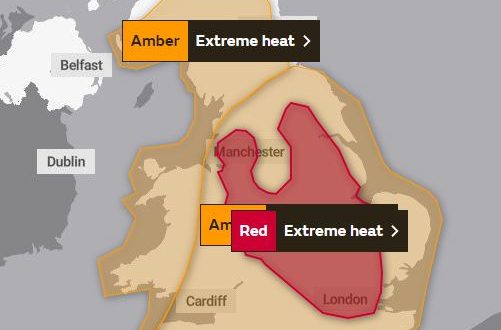A red warning for extreme heat has been issued for South Holland with temperatures expecting to hit the high 30Cs (100F) on Monday and Tuesday. (July 18 and 19).
Lincolnshire is expected to be one of the areas to experience the highest of the temperatures with meteorologists predicting that the record for the highest temperature recorded in the country of 38.7C could be broken.
As of Friday morning (July 15) the temperature on both days was predicted to be 36C-37C in Spalding.
An amber warning for heat is also in place for Sunday when the temperature is expected to be a slightly cooler 31C.
The Met Office said it was issuing the red warning due to an: “An exceptional hot spell on Monday and Tuesday leading to widespread impacts on people and infrastructure.
It says to expect: “population-wide adverse health effects being experienced, not limited to those most vulnerable to extreme heat, leading to serious illness or danger to life” and “delays on roads and road closures, along with delays and cancellations to rail and air travel, with significant welfare issues for those who experience even moderate delays”.
“Substantial changes in working practices and daily routines will be required,” the Met Office say. “There is a high risk of failure of heat-sensitive systems and equipment, potentially leading to localised loss of power and other essential services, such as water or mobile phone services
East Midlands Ambulance Service has issued advice for residents to take steps now to keep themselves healthy as temperatures continue to rise.
A spokesman said, “In order to protect our ambulance crews so they are able to attend the most seriously ill people in the county, we need people to take responsibility for keeping themselves well during the hot weather.
“This means, drinking plenty of water to keep hydrated, staying in the shade or a cool part of the house, taking extra precautions to keep babies and young children cool and hydrated and checking on elderly or vulnerable neighbours.”
David Williams, deputy director of Operations at EMAS said: “We need each and every person to take this heat warning seriously and to do everything they can to stay well to prevent additional pressure on the NHS.
“We continue to experience immense pressure on our ambulance service and our staff are working phenomenally hard to the sickest and most severely injured patients.
“Calling 999 for medical help should be a last resort, after you have tried self-care, your local pharmacy, your GP, NHS111 Online and your local Urgent Treatment Centre.
“If you do call need to call 999 for medical help, you will go through several stages of assessment which may include a call back from one of our control room paramedics or nurses to ensure we are prioritising the patients who need our help first.
“Patients experiencing less serious illnesses or injuries may experience an extended wait for an ambulance, so if you are asked by our 999-control room if you can make your own way to hospital, please do so – either via taxi or asking a friend or family member to drive you.
“This allows us to continue to respond to patients who need our ambulances with highly-skilled clinicians and life-saving equipment on board to provide ongoing treatment on the way to hospital.”
EMAS offers this advice on avoiding heat exhaustion
Drinking plenty of water will help keep you hydrated and avoid unpleasant symptoms such as a headache and cramps. It can also prevent illnesses such as heat exhaustion, which can lead to heatstroke.
The symptoms of heat exhaustion include:
- A headache
- Dizziness and confusion
- Loss of appetite and feeling sick
- Excessive sweating
- Cramps
- Being very thirsty
- A high temperature
- Fast breathing or pulse
If you do experience these symptoms, sit in the shade, drink plenty of water and if they do not improve, seek advice from your GP out of hours service, NHS 111 Online or local pharmacy. To find your nearest services you can search at www.nhs.uk.
 The Voice of Spalding and South Holland
The Voice of Spalding and South Holland




